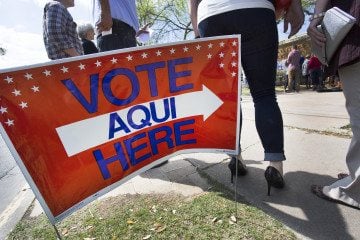Welcome to the 87th Legislative Session. Since the last session came to a close in June 2019, Texas has been hit by an unrestrained pandemic and a crippling economic crisis—and now the fallout from deadly blackouts. Under unprecedented circumstances, lawmakers are faced with a number of urgent challenges. The Texas Observer is following along every step of the way.
Go here for last week’s dispatch from the state Capitol.
What We’re Following:
Republicans’ “Election Integrity” Crusade
In the middle of the night, the Texas Senate passed Senate Bill 7, a sweeping measure that seeks to further restrict voter access. The GOP’s “election integrity” bill would limit early voting hours, prohibit drive-thru voting, reduce polling locations, allow partisan poll watchers to film voters if they “reasonably” suspect fraud, and altogether restrict local election administrators’ ability to expand voting access.

The 18-13 party-line vote came just before 2 a.m. on Thursday after several hours of debate on the Senate floor, with the bill’s author Senator Bryan Hughes (R-Mineola) defending it as a response to unfounded claims of widespread voter fraud. But, in response to questions from Senate Democrats, he insisted that this measure was not spurred by Donald Trump’s false claims of a stolen presidential election, which have prompted Republicans in other states to launch new anti-voter legislation. “I’m not the one trying to make this a national debate; I’m talking about Texas,” Hughes said. Texas has, in fact, tried something like this before: in 2019, the Legislature considered a similarly draconian election bill authored by Hughes. The bill passed in the Senate but died at the last minute in the House.
Democrats’ proposed amendments to address numerous concerns with the legislation were all rejected, except for an accepted amendment from Senator Judith Zaffirini (D-Laredo) that would remove a provision requiring people with disabilities to provide proof of their disability when applying for a mail ballot.
Democrats and voting rights advocates have called it one of the most egregious voter suppression schemes in years. “Republicans’ actions yesterday will go down in infamy as a racist, terrifying attempt to plunge Texas back into Jim Crow. This is not who we are,” Texas Democratic Party Chairman Gilberto Hinojosa said in a statement.
The House Elections Committee heard testimony Thursday on a similar “election integrity” bill authored by committee Chairman Briscoe Cain (R-Deer Park). Consideration of that bill was delayed last week due to a procedural error when Cain abruptly called for recess after a heated exchange with Democratic members.
If the House version passes, the two chambers will likely reconcile any differences in a joint conference. —Justin Miller
Attacks on Abortion Rights
The Texas Senate passed seven anti-abortion bills this week that would dramatically limit access to the procedure across the state. This includes two priorities of Republican Lieutenant Governor Dan Patrick: Senate Bill 8, which would ban abortion at six weeks—before most people know they’re pregnant—and Senate Bill 9, a “trigger ban” that would outlaw abortion in the event that the new conservative U.S. Supreme Court overturns Roe v. Wade. Other bills approved by the state Senate this week include a longtime far-right priority to eliminate an exception to Texas’ 20-week abortion ban in the event of severe fetal abnormality, which could force pregnant people to carry an unviable pregnancy to term, and an omnibus bill that encompasses several of the other measures. The omnibus bill, Senate Bill 1647, was authored by state Senator Charles Perry, a Lubbock Republican who is also pushing for passage of a “sanctuary city for the unborn” ordinance that’s up for a public vote in his city next month. This fall, Perry told a crowd of supporters inside a Lubbock church that he rejects the Roe v. Wade decision that legalized abortion nationwide, saying “God’s truth” is “all that really matters in this.”
A handful of states have passed laws to ban abortion after six weeks of pregnancy, but the efforts have been blocked in court. Texas’ new proposed ban includes a unique and sweeping twist: Any person in the state, whether connected to the situation or not, could sue anyone who “aids or abets” the abortion. On the passage of Senate Bill 8, Governor Greg Abbott—who has overseen the state’s response to the pandemic that has so far claimed the lives of more than 47,000 Texans as well as the brutal winter storm and power outages that resulted in nearly 200 deaths—tweeted his support on Tuesday, writing: “Every unborn child with a heartbeat should be saved from the ravages of abortion.”—Sophie Novack
Electric Grid Reforms
Both the House and Senate passed a number of bills in response to the winter storm that knocked out power to millions of Texans, exposing the failures of the state’s loose regulation of its electric grid.
On Monday, the Senate unanimously approved Senate Bill 3, which would make a number of reforms to the energy industry. For starters, it would require the companies who operate power plants, transmission lines, natural gas facilities, and gas pipelines to weatherize their facilities to withstand extreme cold and heat—and levy fines of up to $1 million a day on those who fail to do so. It would also ban retail electricity plans such as those offered by Griddy that charge customers wholesale prices in real-time, which exposed them to astronomical bills during the storm. The bill would also create a statewide emergency alert system to warn and inform Texans about future extreme weather events and potential blackouts.

The House passed a number of bills the following day that largely addressed the same issues. However, the lower chamber’s weatherization mandate bill—House Bill 11—did not specify penalties for failing to weatherize, and their weatherization mandates do not extend to the natural gas industry, which has aggressively lobbied against such proposals. State Affairs Chairman Chris Paddie (R-Marshall), who wrote the weatherization standards, said that additional reforms dealing with the natural gas industry will come from Energy Resources Committee Chair Craig Goldman (R-Fort Worth).
The legislative action in both chambers has not gone without criticism. Energy experts say that the weatherization requirements don’t go far enough to protect the grid from the sort of extreme cold weather seen in February. They also warn that legislators are charging the Public Utility Commission with more regulatory enforcement responsibilities without any new resources or funding. In addition, environmental advocates and renewable energy proponents have condemned a GOP provision in the Senate bill that would give ERCOT the ability to charge fees to wind and solar operators as a way to counter federal subsidies and address renewables’ “lack of reliability” during energy emergencies. Legislators have also shoehorned into their electric grid disaster response an industry-backed measure to ban local governments from prohibiting natural gas hookups in any new developments. —Justin Miller
What We’re Reading:
Texas closer to expanding internet access after Senate approves plan
Texas families without dependable internet access are closer to a connection after the Senate voted unanimously Wednesday in favor of a bill tackling the digital divide. The legislation would establish a broadband office to oversee improvements to internet access, detail which areas lack connections, establish a program to distribute grants and financial incentives for improved access, and create a statewide plan with long-term goals. / Dallas Morning News

Texas lawmakers propose giving AG Ken Paxton $43M to fight Google
Just a couple months after grilling Attorney General Ken Paxton over his agency’s spending habits and fiscal improprieties, the Senate Finance Committee adopted an amended state budget that would largely restore budget cuts that they had previously threatened to make to Paxton’s office, as well as grant his $43 million request to pay outside lawyers to lead his lawsuit against Google. The committee’s 180-degree-turn came after a concerted pressure campaign from Paxton and a battalion of outside conservative allies. / Houston Chronicle
1.5 million Texans could get Medicaid coverage under bipartisan legislation
A Democratic bill proposes to expand Medicaid coverage by striking a compromise that addresses Republicans’ complaints about approving a federal expansion, including a commitment to end the expanded coverage if the state ends up losing money or the federal government stops funding nearly all of it. Several Republican House members have signed on to the bill and the Democratic author Julie Johnson has said several other conservatives have privately promised their support. Of course, it still remains to be seen if the bill will get a floor vote—or has any chance of getting approved by the Senate. / Houston Chronicle
All Hat, No Cattle
The Texas Legislature is known for its outlandish members, ludicrous antics, and right-wing flare-ups. Here’s your weekly dose.
It’s already difficult for minors to get an abortion in Texas. Through a process known as “judicial bypass,” young people can obtain an order from a judge to permit an abortion without parental involvement—often involving cases of neglect, abuse, or abandonment. In order to get a judge’s approval, teens must prove they are well-informed enough and that it’s in the best interest to not involve parents—this can already be a humiliating and traumatizing process in conservative states like Texas.
Still, Republicans and anti-abortion advocates have relentlessly chipped away at this process in the state Legislature, leading to higher denial rates from judges. The latest effort comes from State Representative Scott Sanford (R-McKinney), who is pushing House Bill 1711, which would allow judges to appoint an attorney to represent the embryo or fetus in a judicial bypass proceeding. Sanford has said the bill is about ensuring that “all parties would be represented.”
“It’s really just a device to stigmatize teens to make them feel like it’s a criminal process for seeking an abortion and also to really just prevent them from getting abortion care,” said Rosann Mariappuram, executive director of Jane’s Due Process, which helps teens access abortion and other reproductive health services.







